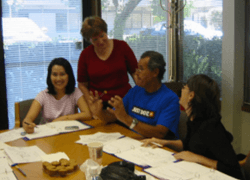American Accent Training
An interview with Sheri Summers,
"The Pronunciation Queen"
AmericanAccentAudios.com
 Sheri
Summers has been working with non-native English speakers as a teacher,
trainer and advisor for the past 20 years.
Sheri
Summers has been working with non-native English speakers as a teacher,
trainer and advisor for the past 20 years.She has helped thousands of individuals improve their pronunciation and speech patterns.
Her accent reduction programs help people from all over the world speak English more clearly and confidently.
Many English learners know English grammar and vocabulary well, but still don't have enough confidence in their speaking because they never learned correct pronunciation.
Using her programs Sheri can help you overcome just that.
So I'm very pleased to have her for this important interview. Let's dive in...
1. Sheri, you've created quite a few foreign accent reduction programs, and helped countless people become more confident and successful when communicating in English. So what made you get into this vocal field? How did it all start?
Well, I started as an English teacher and taught people from all over the world. I lived and worked in 3 different countries and later hosted over 40 international students in my home in Seattle, Washington. Those experiences helped me get a good idea of what kinds of struggles people were having with English.
I started teaching pronunciation because it was something that people weren't getting a lot of in school, and I knew that it would make a huge difference in their everyday lives.
ESL teachers don't necessarily learn a lot about teaching pronunciation and even less on teaching the "music" (or intonation, rhythm and timing) of the language. So I had a big learning curve when it came to figuring out what my friends and students needed.
After much study and trial and error with my poor students, I finally began to discover little things that very few people are consciously aware of when they speak. These are things that we would naturally pick up as little children. But as adults, we become deaf to them and native speakers don't realize how they are using them.
I found when I taught them to my students, they suddenly became aware of this whole new experience in English, and they started making awesome changes to their speech.
2. As you see it, how should a student prioritize the different aspects of English language learning (such as vocabulary, grammar, reading, writing, speaking, and listening)? Where does proper American accent come in?
In all honesty, I think that pronunciation and accent should be taught from the very beginning along with reading, writing, grammar, vocabulary, etc. It should be intertwined with speaking and should (hopefully) be fun.
3. What's your basic motto in teaching the American accent, and why?
"If you believe it, you can achieve it."
Some people come to me with excuses about why they can't learn an American accent. Nonsense! The only reason a person can't learn a new accent is because he thinks he can't.
Anybody (who wants to) can make real changes to their speech. I guess this goes for anything in life.
4. Many English learners are not comfortable using the English they know, since they don't feel confident enough SPEAKING English. How can working on an American accent affect the student's overall communication skills in English?
I totally understand this. Most people don't realize that my basic personality is shy. I, like most people, don't want to make mistakes and look foolish when I speak another language. And I definitely don't want people who have learned English to feel uncomfortable about using their new language.
Some people have even told me that they had been treated like they were stupid just because they had a foreign accent. That makes me feel so bad.
There are definitely some big benefits to learning an American accent. I think the most important thing is that it makes you feel more comfortable and confident in life, especially when you live and work in the US or Canada.
It helps you avoid the "Sorry, can you repeat that?" phrase that causes so many people to doubt themselves.
And believe it or not, improving your speech can potentially bring you a lot more money in life. Better English speakers are much more likely to get hired in the first place and get more promotions once they are on the job.
5. What are the top three pieces of advice you would give English learners who are trying to improve their American accent?
1. Make sure you find out how your current pronunciation and speech patterns differ from a native speaker's and learn exactly what you need to do to make changes to it. (This is my main job as an accent trainer. I help people become aware of what they are missing and how they can add it into their speech.)
2. Now that you know about it, become temporarily hyperaware of how native speakers are using it. This is often a fun, and even shocking, part of the process. There are so many ah-ha moments as you are going through this awareness stage.
3. Practice it on your own and try to use it in your own speech as often as it takes to make it a habit. If you don't create a new habit for yourself, you won't be able to use it consistently.
6. What are the top three pieces of advice you would give teachers teaching the correct American accent?
First of all, the "listen and repeat after me" method doesn't really work. If a sound doesn't exist in your native language, you often can't even recognize it in the second language. So if your student listens and repeats, he will usually fall back on what he is most familiar with anyway.
Also, when teaching pronunciation, it is important to help the students understand how the sound feels as they are getting used to it.
What is touching what? Where is your tongue? How much do you open your mouth? Do you use your muscles to make this sound? Learners need to be able to feel and hear the sound over and over to really get used to it.
Spend more time on intonation, rhythm and timing. Jazz Chants is a really good series that can help with this.
Children learn intonation before they learn pronunciation.
A two-year old will make a ton of mistakes with pronunciation, but his intonation will always be perfect. People actually listen for intonation more than pronunciation, so this is a super important part of communication.
7. What are some of the most common mistakes you see teachers/students make?
The biggest thing I see today is that some schools and teachers still focus on vocabulary and grammar more than anything else. This makes highly educated students who can't communicate.
I always ask my students – If you wanted to be a musician, would you spend 8 years just studying music theory but never actually touch a musical instrument? It would be a big waste of time and money, wouldn't it?
Learning vocabulary and grammar is very important for good English, but if you never actually speak it, what is the purpose of putting all those years of time, effort, and money into it?
8. You offer several different training programs for learning the American accent. Can you tell us more about them? How can one choose the right program for him or her?
Yes, of course. I currently offer 3 different programs.
 The first one is the American
Accent Audio Course which I created several
years ago.
The first one is the American
Accent Audio Course which I created several
years ago. This course specifically focuses on the intonation, rhythm and timing of English.
It is a 16 hour downloadable audio course that breaks accent down into pieces and then builds it back up again so the person can see step by step what is really happening in American English.
The second program is the American Accent Workshop. This is an online video course with recordings of a 34 week class that I did a while back. It is divided into 4 modules.
- Module 1 is on American Vowels
- Module 2 is about American Consonants
- Module 3 is all about Word Intonation and Connecting Words Together
- Module 4 is on Sentence Intonation, and Rhythm & Timing
The third thing I currently offer is One-on-One American Accent Coaching to private students and small groups.
These sessions are done over the internet using an online meeting room. It is very similar to meeting in person because we can see each other, talk to each other, use the whiteboard, and share documents.
The best things about private coaching are first, you can attend from anywhere in the world as long as you have the internet, and second, these sessions are all about you. That means we only work on the things that important for the learner. It's a pretty cool way to learn.
I am also in the process of coming up with some audios to help people practice what they have learned. I am pretty excited about it.
9. One of your popular programs is the American Accent Audio Course. Can you tell us what's special about it?
I originally created the American Accent Audio Course as a 6 month program to offer people something different from the normal pronunciation courses that were already out there.
I had no idea at the time that it would become so popular later on when I packaged it as a downloadable course.
I think the American Accent Audio Course is special because it teaches things that most people (even English teachers) often aren't aware of. I remember being shocked when I learned these things years ago.
But I think the lessons taught in the course are extremely important to know when you are trying to improve the way you sound in English.
Something funny about the audio course… since it took me over 6 months to record, a lot was going on in my life and you can sometimes hear different things in the background.
One of those months I was in Brazil and I think you can hear the traffic of both Rio de Janeiro and Sao Paulo. In a couple of the audios my voice was strange because I was getting over a cold.
10. Finally, are there any programs teachers can use to help their students?
In the beginning I learned a lot from books such as Clear Speech and American Accent Training, so I think they are a good place to start.
And well, honestly, I would recommend any of my courses for teachers who are interested in pronunciation and accent. Why not save some time and take advantage of all the years I put into learning this very interesting subject.
Sheri, thanks a lot for answering our questions. Your knowledge and experience is priceless!
To read more of Sheri's tips, visit American English Pronunciation: Top 10 Tips.
Get Updates, Special Offers, and English Resources
Download your FREE GIFT (the first two chapters of
English Short Stories Book and Workbook)
as soon as you join!

By submitting your email, you consent to receiving updates and newsletters from us and to the sharing of your personal data with third parties for the purposes of sending you communications. We will not spam you. You can unsubscribe at any time. For more information, please see our privacy policy.
Return
from American Accent Training
to Really Learn English Interviews




